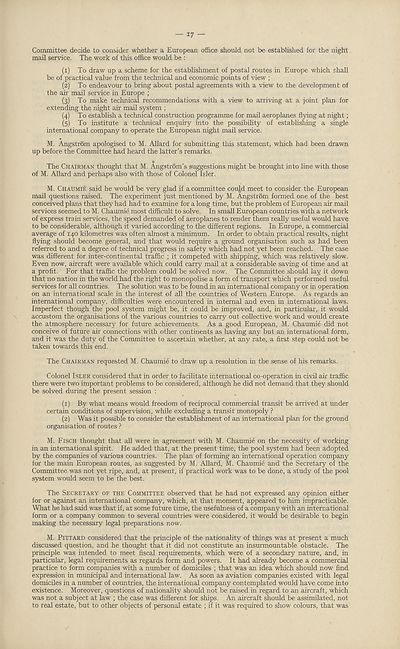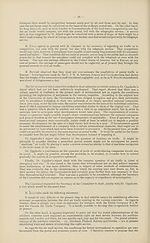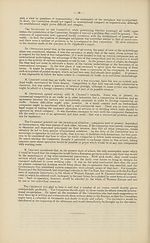Communications and transit > Air transport co-operation committee : minutes of the first session : held at Geneva from July 8th to 12th, 1930
(17)
Download files
Complete book:
Individual page:
Thumbnail gallery: Grid view | List view

— 17 —
Committee decide to consider whether a European office should not be established for the night
mail service. The work of this office would be :
(1) To draw up a scheme for the establishment of postal routes in Europe which shall
be of practical value from the technical and economic points of view ;
(2) To endeavour to bring about postal agreements with a view to the development of
the air mail service in Europe ;
(3) To make technical recommendations with a view to arriving at a joint plan for
extending the night air mail system ;
(4) To establish a technical construction programme for mail aeroplanes flying at night;
(5) To institute a technical enquiry into the possibility of establishing a single
international company to operate the European night mail service.
M. Angstrom apologised to M. Allard for submitting this statement, which had been drawn
up before the Committee had heard the latter’s remarks.
0
The Chairman thought that M. Angstrom’s suggestions might be brought into line with those
of M. Allard and perhaps also with those of Colonel Isler.
M. Chaumie said he would be very glad if a committee could meet to consider the European
mail questions raised. The experiment just mentioned by M. Angstrom formed one of the best
conceived plans that they had had to examine for a long time, but the problem of European air mail
services seemed to M. Chaumie most difficult to solve. In small European countries with a network
of express train services, the speed demanded of aeroplanes to render them really useful would have
to be considerable, although it varied according to the different regions. In Europe, a commercial
average of 140 kilometres was often almost a minimum. In order to obtain practical results, night
flying should become general, and that would require a ground organisation such as had been
referred to and a degree of technical progress in safety which had not yet been reached. The case
was different for inter-continental traffic ; it competed with shipping, which was relatively slow.
Even now, aircraft were available which could carry mail at a considerable saving of time and at
a profit. For that traffic the problem could be solved now. The Committee should lay it down
that no nation in the world had the right to monopolise a form of transport which performed useful
services for all countries. The solution was to be found in an international company or in operation
on an international scale in the interest of all the countries of Western Europe. As regards an
international company, difficulties were encountered in internal and even in international laws.
Imperfect though the pool system might be, it could be improved, and, in particular, it would
accustom the organisations of the various countries to carry out collective work and would create
the atmosphere necessary for future achievements. As a good European, M. Chaumie did not
conceive of future air connections with other continents as having any but an international form,
and it was the duty of the Committee to ascertain whether, at any rate, a first step could not be
taken towards this end.
The Chairman requested M. Chaumie to draw up a resolution in the sense of his remarks.
Colonel Isler considered that in order to facilitate international co-operation in civil air traffic
there were two important problems to be considered, although he did not demand that they should
be solved during the present session :
(1) By what means would freedom of reciprocal commercial transit be arrived at under
certain conditions of supervision, while excluding a transit monopoly ?
(2) Was it possible to consider the establishment of an international plan for the ground
organisation of routes ?
M. Fisch thought that all were in agreement with M. Chaumie on the necessity of working
in an international spirit. He added that, at the present time, the pool system had been adopted
by the companies of various countries. The plan of forming an international operation company
for the main European routes, as suggested by M. Allard, M. Chaumie and the Secretary of the
Committee was not yet ripe, and, at present, if practical work was to be done, a study of the pool
system would seem to be the best.
The Secretary of the Committee observed that he had not expressed any opinion either
for or against an international company, which, at that moment, appeared to him impracticable.
What he had said was that if, at some future time, the usefulness of a company with an international
form or a company common to several countries were considered, it would be desirable to begin
making the necessary legal preparations now.
M. Pittard considered that the principle of the nationality of things was at present a much
discussed question, and he thought that it did not constitute an insurmountable obstacle. The
principle was intended to meet fiscal requirements, which were of a secondary nature, and, in
particular, legal requirements as regards form and powers. It had already become a commercial
practice to form companies with a number of domiciles ; that was an idea which should now find
expression in municipal and international law. As soon as aviation companies existed with legal
domiciles in a number of countries, the international company contemplated would have come into
existence. Moreover, questions of nationality should not be raised in regard to an aircraft, which
was not a subject at law ; the case was different for ships. An aircraft should be assimilated, not
to real estate, but to other objects of personal estate ; if it was required to show colours, that was
Committee decide to consider whether a European office should not be established for the night
mail service. The work of this office would be :
(1) To draw up a scheme for the establishment of postal routes in Europe which shall
be of practical value from the technical and economic points of view ;
(2) To endeavour to bring about postal agreements with a view to the development of
the air mail service in Europe ;
(3) To make technical recommendations with a view to arriving at a joint plan for
extending the night air mail system ;
(4) To establish a technical construction programme for mail aeroplanes flying at night;
(5) To institute a technical enquiry into the possibility of establishing a single
international company to operate the European night mail service.
M. Angstrom apologised to M. Allard for submitting this statement, which had been drawn
up before the Committee had heard the latter’s remarks.
0
The Chairman thought that M. Angstrom’s suggestions might be brought into line with those
of M. Allard and perhaps also with those of Colonel Isler.
M. Chaumie said he would be very glad if a committee could meet to consider the European
mail questions raised. The experiment just mentioned by M. Angstrom formed one of the best
conceived plans that they had had to examine for a long time, but the problem of European air mail
services seemed to M. Chaumie most difficult to solve. In small European countries with a network
of express train services, the speed demanded of aeroplanes to render them really useful would have
to be considerable, although it varied according to the different regions. In Europe, a commercial
average of 140 kilometres was often almost a minimum. In order to obtain practical results, night
flying should become general, and that would require a ground organisation such as had been
referred to and a degree of technical progress in safety which had not yet been reached. The case
was different for inter-continental traffic ; it competed with shipping, which was relatively slow.
Even now, aircraft were available which could carry mail at a considerable saving of time and at
a profit. For that traffic the problem could be solved now. The Committee should lay it down
that no nation in the world had the right to monopolise a form of transport which performed useful
services for all countries. The solution was to be found in an international company or in operation
on an international scale in the interest of all the countries of Western Europe. As regards an
international company, difficulties were encountered in internal and even in international laws.
Imperfect though the pool system might be, it could be improved, and, in particular, it would
accustom the organisations of the various countries to carry out collective work and would create
the atmosphere necessary for future achievements. As a good European, M. Chaumie did not
conceive of future air connections with other continents as having any but an international form,
and it was the duty of the Committee to ascertain whether, at any rate, a first step could not be
taken towards this end.
The Chairman requested M. Chaumie to draw up a resolution in the sense of his remarks.
Colonel Isler considered that in order to facilitate international co-operation in civil air traffic
there were two important problems to be considered, although he did not demand that they should
be solved during the present session :
(1) By what means would freedom of reciprocal commercial transit be arrived at under
certain conditions of supervision, while excluding a transit monopoly ?
(2) Was it possible to consider the establishment of an international plan for the ground
organisation of routes ?
M. Fisch thought that all were in agreement with M. Chaumie on the necessity of working
in an international spirit. He added that, at the present time, the pool system had been adopted
by the companies of various countries. The plan of forming an international operation company
for the main European routes, as suggested by M. Allard, M. Chaumie and the Secretary of the
Committee was not yet ripe, and, at present, if practical work was to be done, a study of the pool
system would seem to be the best.
The Secretary of the Committee observed that he had not expressed any opinion either
for or against an international company, which, at that moment, appeared to him impracticable.
What he had said was that if, at some future time, the usefulness of a company with an international
form or a company common to several countries were considered, it would be desirable to begin
making the necessary legal preparations now.
M. Pittard considered that the principle of the nationality of things was at present a much
discussed question, and he thought that it did not constitute an insurmountable obstacle. The
principle was intended to meet fiscal requirements, which were of a secondary nature, and, in
particular, legal requirements as regards form and powers. It had already become a commercial
practice to form companies with a number of domiciles ; that was an idea which should now find
expression in municipal and international law. As soon as aviation companies existed with legal
domiciles in a number of countries, the international company contemplated would have come into
existence. Moreover, questions of nationality should not be raised in regard to an aircraft, which
was not a subject at law ; the case was different for ships. An aircraft should be assimilated, not
to real estate, but to other objects of personal estate ; if it was required to show colours, that was
Set display mode to:
![]() Universal Viewer |
Universal Viewer | ![]() Mirador |
Large image | Transcription
Mirador |
Large image | Transcription
Images and transcriptions on this page, including medium image downloads, may be used under the Creative Commons Attribution 4.0 International Licence unless otherwise stated. ![]()
| League of Nations > Communications and transit > Air transport co-operation committee : minutes of the first session : held at Geneva from July 8th to 12th, 1930 > (17) |
|---|
| Permanent URL | https://digital.nls.uk/194043568 |
|---|
| Shelfmark | LN.VIII |
|---|
| Description | Over 1,200 documents from the non-political organs of the League of Nations that dealt with health, disarmament, economic and financial matters for the duration of the League (1919-1945). Also online are statistical bulletins, essential facts, and an overview of the League by the first Secretary General, Sir Eric Drummond. These items are part of the Official Publications collection at the National Library of Scotland. |
|---|---|
| Additional NLS resources: |
|

